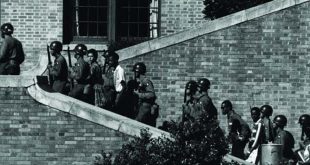An award-winning author and geopolitical analyst, Mahdi Darius Nazemroaya is the author of The Globalization of NATO (Clarity Press) and a forthcoming book The War on Libya and the Re-Colonization of Africa. He has also contributed to several other books ranging from cultural critique to international relations. He is a Sociologist and Research Associate at the Centre for Research on Globalization (CRG), a contributor at the Strategic Culture Foundation (SCF),Moscow, and a member of the Scientific Committee of Geopolitica,Italy:
International institutions and law are increasingly being used to break nations that no now surrender to Washington and its cohorts. IDouble standards are at work. It is very clear that double-standards have and continued to be applied by the ICTY where there are one set of rules for Serbs and another for non-Serbs. The ICTY was a politically-controlled court from its birth. Its mission has been to help brake the spirit of the Serbian nation and its people under the mask of legitimacy. Lets not forget that the ICTY also murdered the late Slobodan Milosevic in 2006.
Any Serbian leader who cooperates with the ICTY is a traitor to not onlySerbia, but to humanity.
Diana Johnstone :
American political writer based in Paris, France. She focuses primarily on European politics and Western foreign policy. Johnstone was European editor of the U.S. weekly In These Times from 1979 to 1990, and continues to be a correspondent for the publication. She was press officer of the Green group in the European Parliament from 1990 to 1996. Johnstone regularly contributes to the online magazine CounterPunch.
„Diana Johnstone’s Fools’ Crusade: Yugoslavia, NATO and Western Delusions (Monthly Review Press, 2002) is essential reading for anybody who wants to understand the causes, effects, and rights-and-wrongs of the Balkan wars of the past dozen years“(Edward S. Herman: Diana Johnstone on the Balkan Wars, Monthely Review Press, February 21, 2003).
Already in April 2011, when Gotovina and Markac were convicted, the excellent commentator Nebojsa Malic suggested that it “would not be out of the realm of possibility to posit that Gotovina and Markac might eventually be sentenced to time served, or even outright acquitted, following the appeals process.” His foresight was based on solid understanding of the ICTY, its purpose and requirements.
As Malic mentioned at the time, the doctrine of “Joint Criminal Enterprise” was invented for the ICTY by a Croatian-American law professor precisely to criminalize a hypothetical plot to create a “Greater Serbia”, held responsible for all the wars of disintegration in formerYugoslavia. Indeed, according to the doctrine used by NATO to justify its 1999 illegal aggression, there could logically be only one “Joint Criminal Enterprise”, the one that implicated virtually the entire Serbian nation.
Therefore it was a total anomaly for the ICTY to charge Gotovina and Markac with taking part in a non-Serb Joint Criminal Enterprise, namely the plan to drive the Serb population out of the Krajina. The motive was not hard to guess: a momentary gesture intended to give the impression that the ICTY was actually an unbiased tribunal, ready to treat all national groups of formerYugoslaviaeven-handedly. The conviction was as temporary as a morning mist. So was the illusion of impartiality.
To restore order and acquit the Croats, ICTY judges have used the same sort of random quibbling that they have used to convict Serbs. There is no genuine court of appeals, so anything goes.
The judges have reassured the Croats that the ICTY is on their side. It has reminded the Serbs that they are the guilty party. The Croats rejoice. As for the Serbs, they should not be surprised. All of the Serbian government’s efforts over the years to cooperate with the ICTY have served only to confirm Serb guilt, because establishing Serb guilt is the very foundation and purpose of the ICTY, its sole raison d’être.
Right now, most of the world is too distracted by other matters to care about what the ICTY does. Outside of the Balkans, it would be hard to find an ordinary citizen who pays the slightest attention to ICTY judgments.
But I believe that someday in the future, a future we probably will not live to see, a new generation of jurists will discover and expose to the world the judicial monstrosity of a tribunal invented by Great Powers to crush a small country. History will be rewritten, as it often is. That will provide no comfort to those who suffer today from the injustice of a mock court designed to stigmatize a small people.
Edward S. Herman :
Professor emeritus of finance at the WhartonSchool, Universityof Pennsylvaniaand has written extensively on economics, political economy, the media and the war in Yugoslavia(1991-1999). Among his books are Corporate Control, Corporate Power (Cambridge University Press, 1981), The Real Terror Network (South End Press, 1982), with Noam Chomsky, The Political Economy of Human Rights (South End Press, 1979), and Manufacturing Consent (Pantheon, 2002), with David Peterson, The Politics of Genocide (Monthly Review Press, 2011); The Srebrenica Massacre, Evidence, Context, Politics (Edited by Edward S. Herman, foreword by Philip Corwin, 2011).
This decision shows once again what was already very obvious–that the ICTY is a political, not a judicial entity, and still serves its original purpose, which was to make the case for the US-Nato dismantling of Yugoslavia by villainizing and attacking Serbia and the Serbs. The ICTY is a creation of theUnited Statesand its Nato allies and has been managed by these powers from the beginning to now. It follows that only Serbs can have a “joint criminal enterprise” and deliberately ethnically cleanse other nations, although the evidence of a JCE and planned ethnic cleansing–and criminal attacks on civilians–was crystal clear in the Croatian Operation Storm. It is also clear that indictments of people like Gotovina and Naser Oric were csarried out in times when there was a need for the appearance of balance, but that these indictments went nowhere in the end is consistent with their purpose and the overall purpose of the ICTY. The ICTY is a travesty of justice system, as is well described in John Laughland’s book with that title: Travesty. The fraudulence of the ICTY as a judicial enterprise is also clearly demonstrated in Michael Mandel’s fine book How America Gets Away With Murder, and in Germinal Civikov’s crushing proof that the ICTY’s star witness, Drazen Erdemovic was a liar and mercenary, who was carefully protected by the ICTY from serious questioning (see Civikov’s book entitled Star Witness). The acquittal of Gotovina and Markac is perfectly consistent with the ICTY’s role and overall hugely political performance.
John Laughland :
The director of Studies of The Institute of Democracy and Cooperation, British philosopher and historian. He is the author of A History of Political Trials from Charles I to Saddam Hussein (Oxford: Peter Lang, 2008); Schelling versus Hegel: from German Idealism to Christian Metaphysics (London: Ashgate, 2007); Travesty: the Trial of Slobodan Milosevic and the Corruption of International Justice (London: Pluto Books, 2007); Le tribunal pnal international: gardien du nouvel ordre international (Paris: Guibert, 2003); The Tainted Source: the Undemocratic Origins of the European Idea (London: Little; Brown, 1997) and The Death of Politics: France under Mitterrand (London: Michael Joseph / Penguin, 1994). His books have been translated into French, Russian, Spanish, Czech, Polish, Serbian and Croatian.
It is naive to be outraged at the ICTY’s acquittal of Generals Gotovina and Markac. The Tribunal was specifically created for the purpose of prosecuting only Serbs. When the idea of a war crimes tribunal was first mooted, by the thenUSSecretary of State, Lawrence Eagleburger, in December 1992, he listed exclusively Serbs as perpetrators of war crimes. So little did Croats or Bosnian Muslims expect to be even indicted by the ICTY that their ambassadors to the UN attended the session of the Security Council in May 1993 when the ICTY was created.
It is therefore entirely logical that the two Croats should have been acquitted, just as it is logical that Kosovo Albanian or Bosnian Muslim warlords like Ramush Haradinaj and Nasir Oric should have been acquitted or treated leniently. The president of the ICTY, theUScitizen Theodor Meron – who had never sat as a judge before being appointed to the ICTY bench – is the same man who read out the conviction for genocide handed down against General Krstic in 2001.
The anti-Serb bias is visible not only in the convictions of Serbs and acquittals of non-Serbs but also in the nature of the prosecutions themselves. While non-Serbs have been prosecuted for individual war crimes, only Serbs (with the exception of Gotovina and Markac) have been prosecuted for allegedly carrying out state policy. This is the political significance of the acquittals of the two Croat generals: with their liberation it is the whole ofCroatiawhich is formally exonerated, and not just two men whom Croats regard as heroes. Carla del Ponte claimed that she would have prosecuted Franjo Tudjman if he had lived but the acquittal of Gotovina and Markac retrospectively destroys the chance of such a prosecution ever having succeeded.
However, above and beyond the national anger understandable generated by this decision, it is important to focus on the procedures which made their acquittal on appeal possible. In a normal judicial system, an acquittal on appeal can come only if additional evidence is produced which had not been available to the trial chamber, or if the original conviction by the trial chamber is found to be unsafe for technical reasons, such as if the defendant’s right to a fair trial has been prejudiced.
In the case of Gotovina and Markac, neither of these conditons is fulfilled. The ICTY Appeals Chamber simply took a different view about the same evidence as that reached by the Trial Chamber. The corpus delicti is identical from the point of view of the two chambers. Consequently, the difference between the convictions for 24 and 18 years handed down by the Trial Chamber, and the complete acquittal granted by the Appeals Chamber, illustrates the extreme fragility of the infamous doctrine used against numerous defendants, joint criminal enterprise.
JCE has been criticised by man legal scholars, including by supporters of the Tribunal, for being too elastic a concept to be used safely for criminal prosecutions. It is said that the concept gives the Prosecutor too much leeway because a potentially very large number of people can be included in its ambit: in the prosecution of Radovan Karadzic, for instance, tens of thousands of people are alleged to have been members of the joint criminal enterprise. JCE can be used to prosecute people for acts they did not commit, know about, order or even intend.
However, with the Gotovina and Markac acquittals, we can see yet another weakness of JCE. JCE was invented as a doctrine of liability to cover up the gap left by the frequent lack of specific evidence for the existence of criminal orders or even of criminal intent. As one of the architects of the ICTY, Michael Scharf wrote, the ICTY’s rules were written specifically “to minimise the possibility of a charge being dismissed for lack of evidence”! JCE is effectively based on the assumption that criminal orders are not given in written form and that therefore the existence of a criminal plan is proved when there is no evidence for it.
Instead, circumstantial evidence is used – with a heavy dose of political interpretation. So the existence of a large number of refugees is either (a) the result of a criminal plan of ethnic cleansing or (b) the unfortunate side-effect of a legitimate military operation in pursuit of an equally legitimate goal. It simply depends on which side you are on. Such questions cannot be answered by a court of law because they are political questions, and that is the reason why the ICTY, like other Tribunals, is political is the profoundest sense of the term.
In the Gotovina and Markac cases, the opinion was taken by the Trial Chamber that the manner in which Operation Storm was conducted proved criminal intent. The Appeals Chamber came to the opposite view and reversed the Trial Chamber decision in a totally arbitrary fashion, without any reference to law or evidence. In a proper court of law it is unimaginable that such a dramatic reversal of fortune could occur without some substantial decision about new evidence or about an error having been committed in law.
The ICTY is therefore the most perfect expression of arbitrary rule. If it is just a matter of opinion whether Messrs Gotovina and Markac deserve to stay in prison until old age or be free men, then the ICTY self-evidently does not apply the law if by “law” is understood a body of fixed rules. It is nothing but a tawdry political organ, its so-called judges merely the willing executors of the new world order dressed up for the purpose in ridiculous and ugly synthetic robes.
 Печат – Лист слободне Србије Политички недељник, актуелна политичка дешавања, друштво, свет, култура.
Печат – Лист слободне Србије Политички недељник, актуелна политичка дешавања, друштво, свет, култура.







